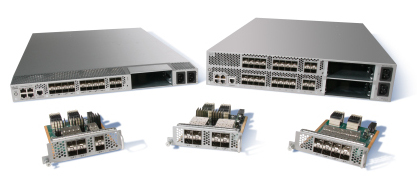Cisco sees its future in the datacentre

Cisco is expanding its fledgling datacentre strategy by releasing a second switching product family and by buying out the company that developed it.
The new products, which will be known collectively as the Cisco Nexus 5000 series, are datacentre switches aimed at providing line-rate, low latency 10Gb Ethernet switching. The devices support Fibre Channel over Ethernet (FCoE) — meaning LAN, fibre channel and iSCSI-based SAN and server cluster traffic can be consolidated over Ethernet.
Cisco says the Nexus 5000 series, together with its predecessor, the 7000 series, helps businesses build what it calls a "unified fabric", which cuts down on the quantity of cabling and adapters required, and reduces power requirements.
The 5000 range was developed by Silicon Valley start-up Nuova Systems. Cisco had bought 80 percent of the company in the summer of 2006. On Tuesday it said it is buying the remaining 20 percent, which is currently held by the company's employees.
The purchase price is yet to be tied down, and is dependent on sales volumes of the Nexus 5000. Nuova could cost Cisco as little as $10m (£5.1m) or as much as $678m (£344m).
Cisco sees great potential in the datacentre market. Its importance to Cisco is growing because the router market — the company's traditional pillar of strength — has reached saturation and margins have started to fall.
Cisco also claims the datacentre sector is reasonably recession-proof. Doug Gourlay, senior director of datacentre solutions at Cisco, said: "The economy is challenging everyone in some way or another. But the datacentre is not an area of discretionary spend."
The networking giant has been dabbling in datacentre products for a few years, having slowly built out a range of SAN equipment, virtualisation software and wide area network acceleration products.
Edison Peres, the Cisco's vice president for worldwide channels, said the company expects to double its datacentre revenue over the next five years to $10bn (£5.1bn). "We are very excited about the datacentre," he said.
Cisco's increasing push into the datacentre space may create dilemmas for the company. Firms such as HP and IBM, which have traditionally worked as partners alongside Cisco on networking contracts, may now feel threatened as they have considerable interests in the datacentre space.
Cisco says it is partnering with a number of vendors as part of its datacentre strategy, but that list does not so far include HP or IBM. Instead, Cisco lists the likes of Intel (adapters), Dell (servers and storage) and VMware (virtualisation), alongside a list of seven smaller vendors.
As if the competition isn't going to provide it with enough food for thought, Cisco will also have to persuade IT departments that the network is the best platform from which to manage a datacentre infrastructure.
However, Nexus products are based on a completely separate operating system from its routers. As Cisco has made so many acquisitions — Nuova is its 126th — it has a whole raft of different operating systems across its many product families, which can make the management of a combined Cisco LAN/datacentre network difficult.
The Nexus 5000 series, which Cisco says could appeal to financial organisations due to the low latency requirements of their applications, is priced from $36,000 (£18,000) for the fixed configuration 40-port model. Cisco plans to release the products in May.
